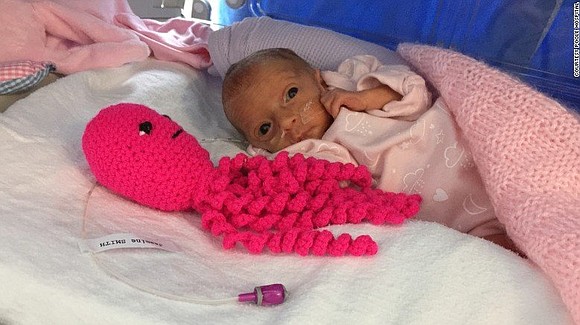Crocheted Octopi Comfort Preemies In Hospital NICU
CNN/Stylemagazine.com Newswire | 2/27/2017, 12:15 p.m.

(CNN) -- Inside neonatal intensive care unit (NICU) incubators at one United Kingdom hospital, premature babies have an unlikely companion -- colorful, crocheted octopi.
These cuddly toys are used as a form of therapy to help comfort and calm premature babies, according to officials at Poole Hospital.
An estimated 15 million babies are born too early every year -- more than one in 10 babies, according to the World Health Organization. Babies born prematurely are at risk for serious health issues including breathing problems, feeding difficulties and developmental delay.
With the octopi, some babies in the NICU experienced better breathing and more regular heartbeats, leading to higher levels of oxygen in their blood, hospital staff said.
"When we heard about the difference a cuddly octopus can make to our tiny babies we were impressed and, after research, eager to introduce them to our little patients. It's incredible that something so simple can comfort a baby and help them feel better," Daniel Lockyer, a neonatal services matron at Poole Hospital in Poole, Dorset, England said in a press release.
What's comforting about these octopi are their soft tentacles, which hospital staff say remind babies of the umbilical cord and their mother's womb. They found that babies cuddling an octopus are less likely to pull out their monitors and tubes.
"Babies are active inside their mothers and constantly interacting with the placenta," says Dr. Valencia Walker, an associate professor at UCLA and the medical director of NICU at the Santa Monica-UCLA Medical Center.
"One of the things we recognize is that we can never fully replicate the sensation of being in a mother's womb -- but we try to find ways."
Walker hasn't tried the octopi, but because the field of neonatology is relatively young, health workers are always seeking innovative ways to create an environment that is nurturing and non-artificial for premature babies.
However, it is important to be cautious about using these types of therapies that have not been fully studied yet.
Walker says to stick with the research and keep an objective view when trying these types of therapies.
"While it may work great with one sick baby, it may not always work with another," she cautioned.
She recommends looking at therapies that have been rigorously studied and tested. "There are other types of interventions that similarly replicate the sensation of being in the womb," she said.
For more information go to http://www.CNN.com







